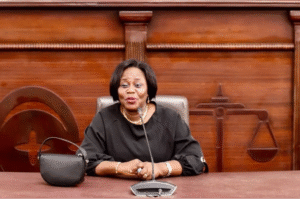
Photo: Dr Hugh Brown in action
• Brown Signs Off Ghana’s Greens to Gold Diggers
• 4 Forest Entry Permits in Just 2 Months!
As Ghana grapples with the environmental fallout of illegal mining, official documents obtained by The Hawk have exposed a fresh and deeply troubling dimension: the issuing of forest entry permits by the Forestry Commission itself, effectively granting mining companies legal access to protected forest reserves.
At the centre of the scandal is Dr Hugh C. A. Brown, recently elevated Chief Executive Officer of the Forestry Commission and a legacy appointee from the previous Akufo-Addo administration.
Records reviewed by The Hawk reveal that Dr Brown approved at least four Forest Entry Permits (FEPs) in May and June 2025 alone, authorising mining-related activities in several forest reserves already under pressure from illegal mining.
The beneficiaries include Gateway Exploration, JBF Associates, Amby Ltd, and PJ Minerals — all granted permission to commence exploration or gold mining in areas such as the Kagyeasi Forest in the Eastern Region, Bosumkese Forest in Bechem, Offin Shelterbelt, and Jimira Forest in the Ashanti Region.
In the case of PJ Minerals, Forestry Commission records show the payment of GH¢1,465,500 on June 10th, 2025. The accompanying permit was controversially backdated to June 11, 2024, raising serious questions about administrative integrity, given that Dr Brown was not yet in office at that time.
Institutional Sabotage?
The revelations come amid strong public sentiment against mining in forest reserves. Conservation groups, traditional leaders and civil society organisations have all called for a total moratorium on mining in such zones, citing biodiversity loss, river pollution, and weakened water security.
“We were promised a decisive clampdown on mining in forests. What we’re seeing instead is institutional sabotage,” said a senior official at the Ministry of Lands and Natural Resources, who spoke on condition of anonymity.
Benjamin Nsiah of the Centre for Environmental Management and Sustainable Energy (CEMSE) described the situation as “environmental vandalism with state endorsement.”
“Our forests are not cash registers. Permits like these undermine national efforts to preserve our ecosystems,” Nsiah said.
Governance Concerns and Internal Fallout
Beyond the ecological implications, there are also growing concerns about governance and accountability within the Forestry Commission itself.
Multiple Commission insiders told The Hawk that Dr Brown has cultivated a culture of opacity and exclusion. Internal memos and communications frequently omit the Deputy Chief Executive Officer — a move seen by some as deliberate marginalisation.
Dr Brown is also alleged to have signed contracts that exceed his administrative threshold without notifying the sector ministry responsible for oversight. When leaks about these approvals began surfacing internally, he reportedly ordered the transfer of two registry officers, Bernard Baah and Benjamin Opoku, without clearance from the Human Resources Directorate — a breach of standard protocol.
“He believes he is untouchable,” said one staffer. “There is no transparency, no checks, and no fear of consequences. That is deeply dangerous for a regulatory institution.”
A Worsening National Picture
Ghana currently has 288 gazetted forest reserves. According to The Hawk’s checks, 44 of them — covering more than 5,000 hectares or roughly 7,500 football pitches — have already been compromised by illegal mining operations.
“This is not just a case of poor judgment or administrative error,” said environmental and Energy activist Benjamin Nsiah. “It is a systemic failure and a betrayal of public trust.”
The Lands Ministry has so far remained silent on the matter, despite growing pressure from The Hawk for an emergency audit and the immediate suspension of Dr Brown pending further investigations.
“We are calling for Parliament to intervene urgently,” said one policy expert. “Ghana’s forests are not only environmental assets — they are national heritage. If we do not act, we risk losing them permanently.”
What Next?
As more internal documents continue to surface and the extent of the approvals becomes clearer, the question remains: how many forests have already been signed away — and at what cost?
The Forestry Commission has not responded to requests for comment at the time of publication. Dr Brown also declined to comment when contacted by The Hawk.
But as the country faces unprecedented environmental strain, critics say what’s at stake is far more than policy — it is Ghana’s ecological future.
“You can’t fight galamsey with one hand and issue permits with the other,” Atuahene warned. “This is not just mismanagement. It is criminal negligence.”
The Hawk will be watching. Closely.






